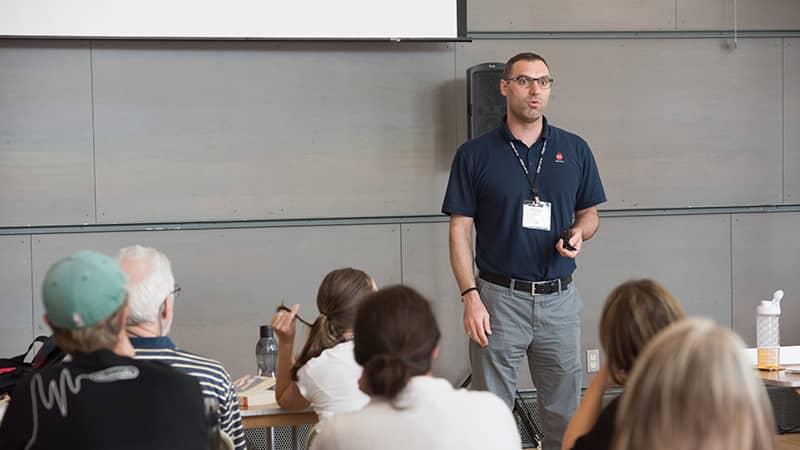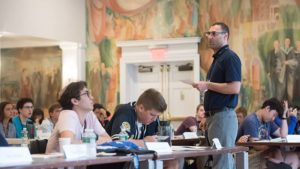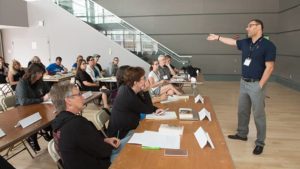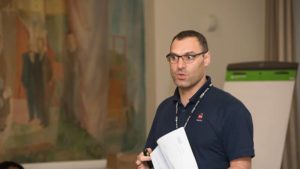
The grandson of a KGB captain in Soviet-occupied Georgia in the 1980s, mentor teacher Malhaz Jibladze had a unique position in the world. He enjoyed a fairly normal childhood with many privileges. Growing up, he could see what was happening in Georgia but didn’t fully comprehend the complexities and consequences of communism. It was not until he left Georgia as a teenager after the collapse of the Soviet Union that he realized the harsh realities of Soviet rule.

At age 16, Jibladze came to the U.S. for the first time. He stayed with a host family and attended the Liberal Arts and Science Academy in Austin, Texas. Economics fascinated him, and his experiences shaped his particular passion for economic development. This led him to study the subject at the University of Texas at Austin.
After graduating with a bachelor’s degree in economics, Jibladze secured a job as a teacher at his high school alma mater. It was here that he first encountered TFAS high school division, the Foundation for Teaching Economics. In 2006, he participated in his first economics conference. Immediately hooked by the professionalism and structure of the program, Jibladze thoroughly appreciated TFAS’s approach to instilling an understanding of how economic freedom sparks human ingenuity and prosperity. He continued participating in seminars and conferences until 2011 when he was offered a position as a mentor teacher.
“I knew that economics was something I was interested in, but I was hooked by the fact that FTE provided such a professional program,” Jibladze said. “It was something very valuable, not just for the classroom, but for the individual.”
…I was hooked by the fact that FTE provided such a professional program. It was something very valuable, not just for the classroom, but for the individual.” – Malhaz Jibladze
Teaching the “Economic Way of Thinking”
When Jibladze first began teaching with the TFAS high school division, many of the conferences and programs he led were geared toward instructing teachers in addition to students. He wanted to provide direct, clear and concise lessons to ensure fellow teachers received the tools they needed to share the message that economic freedom is a powerful engine of growth that improves people’s lives. Economics, social studies and history teachers all attended these programs, but many of them lacked formal training in basic economics. To teach them most effectively, Jibladze combined his knowledge with FTE lesson plans and resources and tailored his trainings to provide a bridge to understanding foundational economic concepts.

In addition to teaching and mentoring with TFAS, Jibladze also teaches AP economics at Thomas Jefferson High School for Science and Technology in Northern Virginia while pursuing a Ph.D. in economics from George Mason University. He says the opportunity to pursue this degree stemmed from his time with FTE. Jibladze has now finished all his coursework and is working on his dissertation.
Through TFAS, he discovered that one important way to reach people is with storytelling. Jibladze incorporates stories of his childhood in a socialist country to drive home the concepts he teaches. He believes this makes economics more accessible and engaging.
“As teachers, the best thing we can do is to be good storytellers,” Jibladze said. “That’s what hooks the students.”
He describes economics as society’s “grammar” of choice. When learning a new language, grammar is one of the first things you learn. As you become fluent, you start speaking without thinking about grammar, but you still operate based on those rules. Economics functions much the same way. TFAS’s simulations help students visualize the impact of rules, choices and decision-making on society, which distinguishes these programs from all other economic education initiatives.
The number and type of programs Jibladze teaches has fluctuated over the years, but “The Economic Demise of the Soviet Union” remains one of his favorites because it allows him to draw on his background and share firsthand insight. TFAS offers this course both online and as a one-day program for teachers.
Promoting Active Learning

Aside from individual programs, Jibladze’s favorite part of his job is teaching simulations in person. He views simulations as the culminating factor of the programs because they drive lessons home and help students learn how to make choices more effectively.
“The big part about FTE is the way we provide simulations,” he said. “That’s huge in terms of getting students really interested and helping them understand on a basic level, ‘Why did I do this? Why did I make that choice?’”
Jibladze believes that with the role of government increasing in today’s world, young people need to understand the true costs of their choices. He sees students come to his classroom with good intentions, but he knows good intentions are not enough. He says students must think through the solutions they propose, and they must think critically and economically through all the consequences of their ideas to make sure they’re really solving the problem.
Jibladze believes that TFAS’s work is critical because the programs teach more than just economics – they also teach problem-solving and leadership skills.
“It’s not enough for you to be a good problem solver if you can’t communicate and you’re not a team player, which is why FTE teaches both economics and leadership with its Economics for Leaders programs,” he explained.
It’s not enough for you to be a good problem solver if you can’t communicate and you’re not a team player, which is why FTE teaches both economics and leadership…” – Malhaz Jibladze
In 2021, Jibladze is celebrating one decade of teaching the economic way of thinking to students and fellow teachers around the globe with TFAS high school division, the Foundation for Teaching Economics. Jibladze says program faculty and staff, including Kathy Ratte, Debbie Henney, Ken Leonard and Dan Benjamin, have been instrumental mentors and friends throughout his career, and he is grateful for their role in encouraging him to join the FTE team ten years ago.
To learn more about how TFAS’s transformative programs reach high school students with the ideas of economic freedom, visit TFAS.org/FTESummer21.

